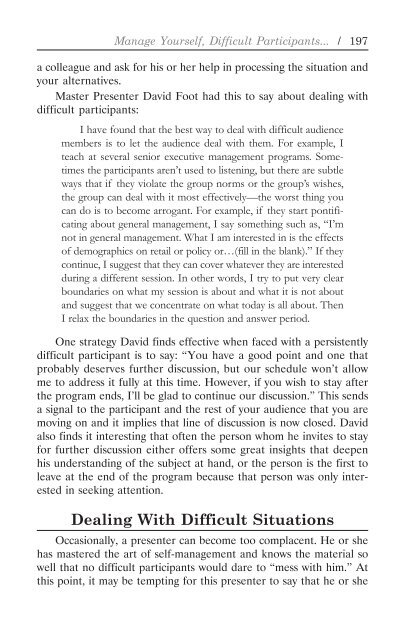The Seven Strategies of Master Presenters - Lifecycle Performance ...
The Seven Strategies of Master Presenters - Lifecycle Performance ...
The Seven Strategies of Master Presenters - Lifecycle Performance ...
You also want an ePaper? Increase the reach of your titles
YUMPU automatically turns print PDFs into web optimized ePapers that Google loves.
Manage Yourself, Difficult Participants... / 197<br />
a colleague and ask for his or her help in processing the situation and<br />
your alternatives.<br />
<strong>Master</strong> Presenter David Foot had this to say about dealing with<br />
difficult participants:<br />
I have found that the best way to deal with difficult audience<br />
members is to let the audience deal with them. For example, I<br />
teach at several senior executive management programs. Sometimes<br />
the participants aren’t used to listening, but there are subtle<br />
ways that if they violate the group norms or the group’s wishes,<br />
the group can deal with it most effectively—the worst thing you<br />
can do is to become arrogant. For example, if they start pontificating<br />
about general management, I say something such as, “I’m<br />
not in general management. What I am interested in is the effects<br />
<strong>of</strong> demographics on retail or policy or…(fill in the blank).” If they<br />
continue, I suggest that they can cover whatever they are interested<br />
during a different session. In other words, I try to put very clear<br />
boundaries on what my session is about and what it is not about<br />
and suggest that we concentrate on what today is all about. <strong>The</strong>n<br />
I relax the boundaries in the question and answer period.<br />
One strategy David finds effective when faced with a persistently<br />
difficult participant is to say: “You have a good point and one that<br />
probably deserves further discussion, but our schedule won’t allow<br />
me to address it fully at this time. However, if you wish to stay after<br />
the program ends, I’ll be glad to continue our discussion.” This sends<br />
a signal to the participant and the rest <strong>of</strong> your audience that you are<br />
moving on and it implies that line <strong>of</strong> discussion is now closed. David<br />
also finds it interesting that <strong>of</strong>ten the person whom he invites to stay<br />
for further discussion either <strong>of</strong>fers some great insights that deepen<br />
his understanding <strong>of</strong> the subject at hand, or the person is the first to<br />
leave at the end <strong>of</strong> the program because that person was only interested<br />
in seeking attention.<br />
Dealing With Difficult Situations<br />
Occasionally, a presenter can become too complacent. He or she<br />
has mastered the art <strong>of</strong> self-management and knows the material so<br />
well that no difficult participants would dare to “mess with him.” At<br />
this point, it may be tempting for this presenter to say that he or she










